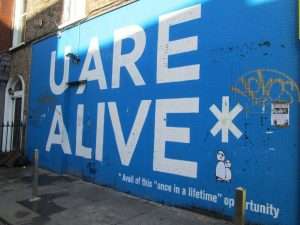There was a training evening on suicide this week. There were fifteen of us at the three hour presentation – fourteen women plus myself. The gender imbalance at the training said much about the nature of the problem, and perhaps about the nature of the incomprehension.
One participant recounted a tale of a spate of suicides among teenage boys in a provincial town. “Why would a boy of fourteen or fifteen want to die by suicide?” someone asked. There was no answer forthcoming.
I spoke up, “Because it’s horrible being fifteen.” It wasn’t an explanation, it probably only raised questions in the minds of the others. Would a teenage girl have thought fifteen a horrible age to be? There was a moment’s thought of trying to talk about Inspector Morse, the fictional television detective played by John Thaw who, together with his lieutenant Sergeant Lewis, investigated murders in Oxford from the 1980s until his sudden demise in 2000. Introducing someone who did not even exist to the conversation would probably have only further mystified those who could not understand why the suicides had taken place.
It was in 1992 that Morse talked with Sergeant Lewis about thoughts of suicide. Maybe Morse would have understood the boys:
Morse: She didn’t do anything special against me. It was just the steady accumulation; the drip, drip, drip of humiliations . . . hatreds, when you’re that age.
So I suddenly thought, ‘Sod this. I’m getting out of this; it’s not worth it’.
Lewis: You ran away?
Morse: I decided to kill myself. I thought of all the ways of doing it, then I put them in order: one, two, three . . . all the way down to about fifteen; which would hurt me the most; which would hurt dad; which would Gwen. I even thought of which would hurt little Joycey the least. I liked Joyce.
Then I thought, ‘That’s pretty bloody clever what you’ve done’, because I’m vain. I was vain even then!
And then I thought, ‘If you’re clever enough to have done all that: well, it’s the waste of a good mind’.
Lewis: I can just imagine you saying that.
Morse: No-one can imagine someone else’s pain, Robbie. It’s the human tragedy.
But I made a vow, I wouldn’t forget. I would never forget how awful it is to be fifteen.
I’ve forgotten, of course, everyone does. But I’ve been trying to remember.
It was horrible being fifteen, in that no man’s land between childhood and adulthood. Perhaps it being horrible is not a sufficient explanation, but perhaps it is the start of an understanding. Perhaps a script from Morse expresses it better than most men could at a public meeting.
